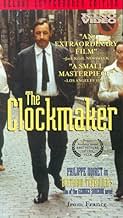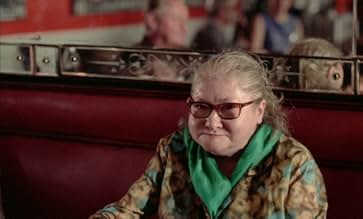AVALIAÇÃO DA IMDb
7,1/10
2,9 mil
SUA AVALIAÇÃO
Adicionar um enredo no seu idiomaA Watchmaker finds out one day that his son has become a murderer. He tries to understand for whom and why.A Watchmaker finds out one day that his son has become a murderer. He tries to understand for whom and why.A Watchmaker finds out one day that his son has become a murderer. He tries to understand for whom and why.
- Prêmios
- 4 vitórias e 1 indicação no total
Enredo
Você sabia?
- CuriosidadesThe house where Michel meets the old lady who took care of his son is the house where Bertrand Tavernier lived his childhood with his parents during WWII. René Tavernier was a friend of Louis Aragon and Elsa Triolet.
- Erros de gravaçãoAt 33:08' a waiter enters the police station with a tray with four beers. Camera cuts to the adjacent office and when it returns, there are only two beer bottles left.
- Cenas durante ou pós-créditosto Jacques Prevert
- ConexõesEdited into Le documentaire culturel: Le siècle de Simenon (2014)
Avaliação em destaque
Bernard Tavernier once confessed that the greatest influence in his life had been the work of directors Akira Kurosawa and Michael Powell. This might explain his direction of the film based in the novel by Georges Simenon's.
It shows a Tavernier more concerned with the character study of M. Descombes, as he goes through the horror of understanding what had caused his son to commit the crime of which he is been accused of perpetrating. In doing so, M. Tavernier embraces the "old French cinema", as he shuns away the New Wave methods of story telling.
One can see clearly what's going on in Descombes' mind, at all time. His son has grown up and is not a child anymore. We see this father come home and encounters newspaper reporters and he goes into his son's room and lays down in the bed that perhaps the younger man has not slept in for quite some time. We watch as Descombs descends into hell because he can't comprehend what has triggered his son into doing what seems repugnant to him and his dignity.
Pilippe Noiret was born to play Descombes. This actor with such subtlety, underplays the clockmaker, and the father. What comes to the surface is the inner turmoil that Descombes is experiencing. This is another example of how good an actor M. Noiret is because with an economy of gestures he builds the character. Jean Rochefort, as the inspector, is also good. M. Rochefort is another actor that always surprises.
This movie is a psychological portrait of a man at the crossroads of despair. Only at the end, father and son seem reconciled with one another. The city of Lyons has been photographed lovingly in this film.
This is a Tavernier for discriminating tastes.
It shows a Tavernier more concerned with the character study of M. Descombes, as he goes through the horror of understanding what had caused his son to commit the crime of which he is been accused of perpetrating. In doing so, M. Tavernier embraces the "old French cinema", as he shuns away the New Wave methods of story telling.
One can see clearly what's going on in Descombes' mind, at all time. His son has grown up and is not a child anymore. We see this father come home and encounters newspaper reporters and he goes into his son's room and lays down in the bed that perhaps the younger man has not slept in for quite some time. We watch as Descombs descends into hell because he can't comprehend what has triggered his son into doing what seems repugnant to him and his dignity.
Pilippe Noiret was born to play Descombes. This actor with such subtlety, underplays the clockmaker, and the father. What comes to the surface is the inner turmoil that Descombes is experiencing. This is another example of how good an actor M. Noiret is because with an economy of gestures he builds the character. Jean Rochefort, as the inspector, is also good. M. Rochefort is another actor that always surprises.
This movie is a psychological portrait of a man at the crossroads of despair. Only at the end, father and son seem reconciled with one another. The city of Lyons has been photographed lovingly in this film.
This is a Tavernier for discriminating tastes.
- jotix100
- 14 de nov. de 2004
- Link permanente
Principais escolhas
Faça login para avaliar e ver a lista de recomendações personalizadas
- How long is The Clockmaker?Fornecido pela Alexa
Detalhes
- Tempo de duração1 hora 45 minutos
- Mixagem de som
- Proporção
- 1.66 : 1
Contribua para esta página
Sugerir uma alteração ou adicionar conteúdo ausente

Principal brecha
By what name was O Relojoeiro (1974) officially released in India in English?
Responda
![Assistir a Bande-annonce [OV]](https://m.media-amazon.com/images/M/MV5BZTA2YTQxYjYtNTE3NS00NTg0LWFiMjItMzgyMmZjYzdhMTJlXkEyXkFqcGdeQXRyYW5zY29kZS13b3JrZmxvdw@@._V1_QL75_UY281_CR6)
















